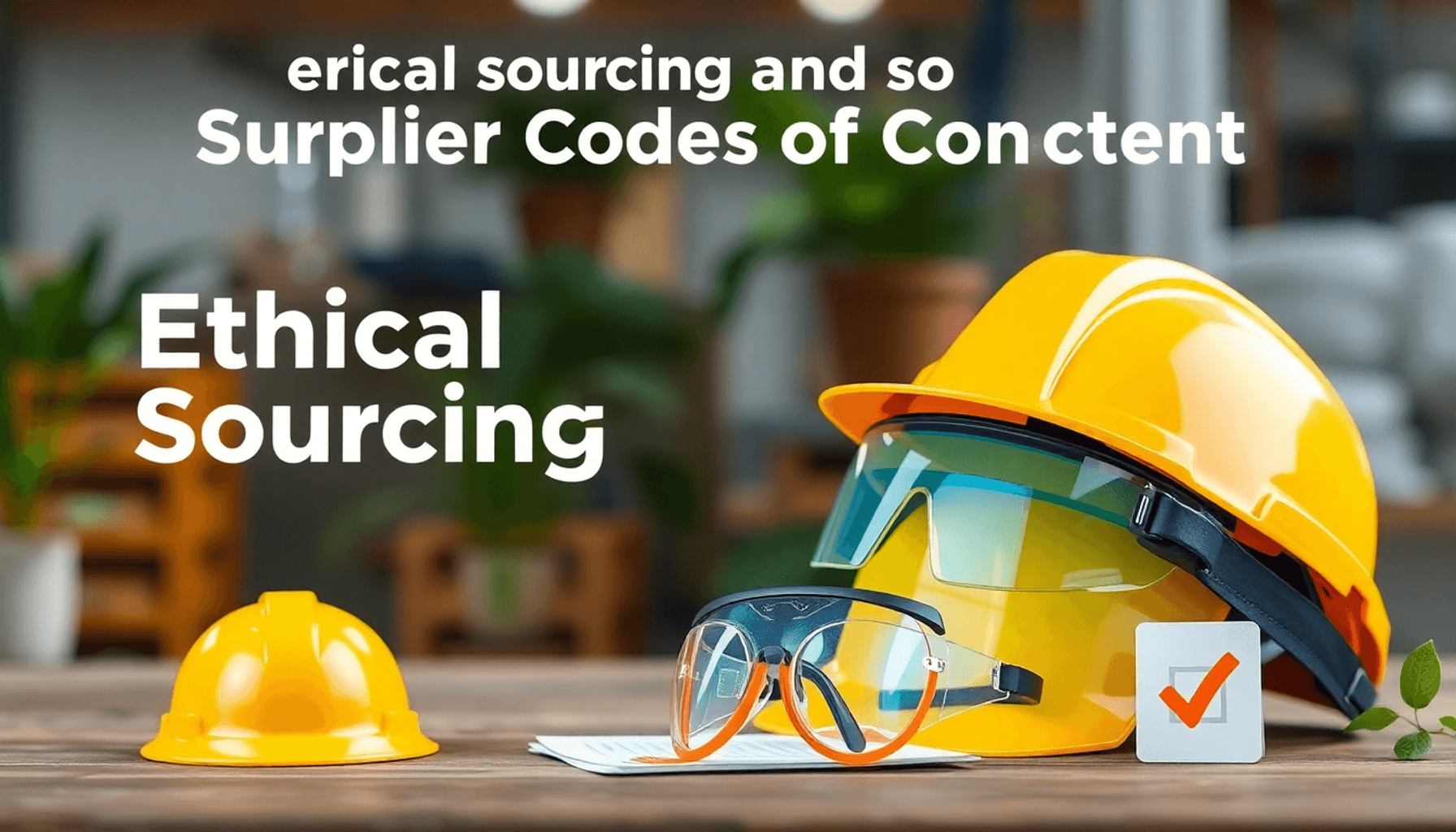Understanding Supplier Codes of Conduct
A Supplier Code of Conduct (CoC) is a set of guidelines that outlines the ethical standards and expectations for suppliers. These standards are crucial for promoting ethical sourcing and ensuring that suppliers adhere to labor laws, environmental regulations, and moral business practices. For businesses aiming to create a responsible supply chain, understanding these codes is essential.
1. Labor Standards
Labor standards form a significant component of any Supplier Code of Conduct. They establish expectations for:
- Importance of Safe Working Conditions: Suppliers must provide a safe and healthy working environment. This encompasses proper sanitation, adequate ventilation, and suitable safety measures to prevent accidents. Failure to ensure safe working conditions can lead to severe consequences not only for employees but also for the supplier’s reputation. For instance, implementing essential PPE for airborne precautions in healthcare can significantly enhance workplace safety.
- Prohibition of Forced and Child Labor: A robust CoC explicitly prohibits any form of forced or child labor. Suppliers are expected to comply with local and international laws regarding the age of employment and should not engage in practices that coerce workers into labor against their will. For example, companies that enforce strict age verification processes demonstrate their commitment to ethical labor practices.
- Rights to Organize and Freedom of Association: Workers must have the right to organize, join unions, and engage in collective bargaining without fear of retaliation. This principle supports fair wages and equitable treatment within the workforce. Establishing an environment where employees can voice their concerns contributes to higher morale and productivity. Leveraging drastic cost reduction through collective spend can also play a role in achieving better wage outcomes.
The implementation of these labor standards fosters a culture where worker rights are respected. By adhering to these principles, suppliers not only comply with ethical guidelines but also enhance their credibility in the market.
Incorporating a Supplier Code of Conduct can mitigate risks associated with unethical practices while strengthening relationships with stakeholders committed to social responsibility. Engaging with suppliers who prioritize ethical operations leads to better outcomes for everyone involved in the supply chain.
Moreover, organizations like nonprofits can benefit from understanding how to maximize federal grant funding, which could be used towards enhancing supplier relationships or improving internal procurement functions. For those managing such functions alone, it’s crucial to adopt strategic solutions that optimize cost efficiency and supplier management, as outlined in our tips for managing a one-person procurement function.
2. Health and Safety
Maintaining a safe work environment is fundamental within a Supplier Code of Conduct. Essential aspects include:
-
Requirements for Safety: Adherence to safety regulations protects worker rights and ensures fair wages. Suppliers must implement protocols that meet or exceed local and international standards.
-
Protective Equipment and Sanitation: Providing appropriate protective gear is crucial for occupational health. Suppliers should prioritize sanitation practices to minimize hazards and promote a healthy workplace.
-
Emergency Preparedness Plans: Effective emergency preparedness strategies are vital. Suppliers must have response plans in place, including training programs for employees to handle potential crises.
These components not only fulfill ethical sourcing commitments but also contribute to a robust supply chain. By prioritizing health and safety, suppliers demonstrate their dedication to ethical standards, ensuring a sustainable and responsible business environment.
This commitment to safety can also be seen as part of a larger strategy for procurement optimization, which involves streamlining processes to enhance efficiency and value. Furthermore, staying informed about top trends in supplier innovation can provide suppliers with the tools they need to implement these health and safety measures effectively. However, it’s important to avoid certain procurement terms that may hinder clear communication about these essential safety requirements.
3. Environmental Responsibility
A Supplier Code of Conduct must emphasize environmental responsibility. Compliance with environmental laws is a fundamental requirement for suppliers. Adhering to these regulations not only protects the environment but also enhances the sustainability of supply chains.
Key strategies for minimizing ecological impact include:
- Waste Management: Implementing effective recycling and waste reduction programs.
- Resource Efficiency: Utilizing energy-efficient processes and materials.
- Sustainable Sourcing: Prioritizing suppliers who use renewable resources and environmentally friendly practices.
Additionally, suppliers should adopt sustainable practices such as:
- Green Certifications: Pursuing certifications that validate eco-friendly operations.
- Carbon Footprint Reduction: Setting measurable goals to lower carbon emissions.
By integrating these principles into their operational guidelines, suppliers can contribute positively to the environment while aligning with the ethical sourcing goals of their clients. This commitment to sustainability is vital in fostering a responsible supply chain that respects both worker rights and ecological balance.
4. Ethical Business Practices
Maintaining ethical standards is crucial in the development of a Supplier Code of Conduct (CoC). It establishes clear supplier guidelines that promote:
- Fair wages and respect for worker rights
- Prohibition of discrimination in hiring and employment practices
- Mechanisms to prevent conflicts of interest and bribery
A robust CoC includes key components such as:
- Business ethics that ensure transparency in transactions
- Policies for corruption prevention, safeguarding against unethical practices
- Clear respect for intellectual property rights and confidentiality
By adhering to these principles, suppliers foster trust and accountability within the supply chain. The importance of ethical sourcing cannot be understated; it not only enhances brand reputation but also contributes to a more equitable marketplace. Embracing these values creates a foundation for sustainable business relationships, ensuring all parties benefit from fair and just practices.
Moreover, understanding ethics in international business is vital as companies expand their operations globally. This involves navigating different legal systems and cultural expectations while maintaining ethical integrity.
In addition, businesses can succeed with limited resources by embracing constraints, optimizing processes, and leveraging networks while still upholding these ethical standards.
5. Compliance with Laws and Monitoring Mechanisms
Adhering to local and international laws is crucial for maintaining ethical standards in supply chains. A Supplier Code of Conduct (CoC) establishes guidelines that align with these legal frameworks, ensuring:
- Worker Rights: Protection against discrimination, fair wages, and safe working conditions.
- Environmental Protection: Compliance with regulations regarding ecological impact.
A robust CoC includes key components such as:
- Clear expectations for suppliers to meet legal obligations.
- Procedures for reporting violations of ethical standards.
Audits play a vital role in ensuring compliance with the CoC. Regular assessments allow businesses to verify that suppliers adhere to established guidelines, including:
- Documentation reviews
- Site inspections
- Employee interviews
These practices not only help mitigate risks associated with unethical behavior but also foster transparency and accountability within the supply chain. By integrating legal compliance into supplier relationships, companies can enhance their commitment to ethical sourcing.
6. Promoting Diversity and Inclusion in the Supply Chain
Promoting diversity within the supply chain is essential for fostering innovation and enhancing competitiveness. A robust Supplier Code of Conduct should emphasize:
- Inclusive Hiring Practices: Encourage suppliers to adopt strategies that support underrepresented groups, ensuring equitable opportunities within their workforce. This could involve implementing entry-level procurement jobs that are accessible to diverse candidates.
- Workforce Diversity: Diverse teams often lead to better decision-making and problem-solving, directly impacting business performance. Understanding diversity, equity, and inclusion (DEI) in the workplace can significantly enhance these efforts.
Incorporating these principles not only aligns with ethical sourcing but also strengthens supplier guidelines. Organizations benefit from diverse perspectives, which can drive creativity and growth.
By prioritizing worker rights and fair wages, companies reinforce their commitment to ethical standards in supply chains. Addressing discrimination through comprehensive policies creates an equitable environment, ultimately leading to a more sustainable and responsible sourcing strategy. Additionally, understanding the difference between purchasing groups and group purchasing organizations can help organizations make more informed decisions in their procurement processes.
The Role of Hubzone Depot LLC in Promoting Ethical Sourcing
Hubzone Depot LLC is a Tier 1 HUBZone Certified Woman-Owned Office and Industrial Supplier. Founded by Jessica S. Presco, this business champions ethical sourcing initiatives while addressing the needs of public sector clients.
Key aspects of their mission include:
- Commitment to Community: By employing individuals from HUBZones, Hubzone Depot reinforces its dedication to local economies and job creation.
- Transparency and Integrity: Their Supplier Code of Conduct outlines clear expectations for vendors, emphasizing ethical practices throughout the supply chain.
The Supplier Code of Conduct not only focuses on compliance with labor standards but also:
- Prohibits forced and child labor.
- Supports the rights of workers to organize.
- Encourages safe working conditions.
These principles ensure that all partners are held to high ethical standards, fostering trust and collaboration. As a Women’s Business Enterprise (WBE), Hubzone Depot exemplifies leadership in promoting diversity within the supply chain while maintaining a rigorous approach to ethical sourcing.
To further enhance their ethical sourcing efforts, Hubzone Depot employs strategic sourcing techniques that go beyond traditional methods. This includes tail spend management, which allows them to optimize costs while maintaining quality.
Moreover, the company places a strong emphasis on supplier relationship management, ensuring that they build and maintain strong relationships with their suppliers. This is crucial in maximizing supplier performance, which in turn ensures quality and reliability in their sourcing efforts.
This commitment not only enhances their brand reputation but also sets a benchmark for other companies in the industry.
Benefits, Challenges, and Future Perspectives on Implementing a Supplier Code of Conduct
Implementing a Supplier Code of Conduct (CoC) offers numerous advantages.
Benefits of Implementing a Supplier Code of Conduct
- Risk Mitigation: A well-defined CoC helps in identifying and addressing unethical practices among suppliers. This proactive approach reduces the likelihood of scandals that can harm your organization’s reputation.
- Brand Reputation: Responsible sourcing reinforces your commitment to ethical standards, enhancing your brand image. Consumers increasingly prefer companies that demonstrate social responsibility.
One way to ensure responsible sourcing is through compliance-driven sourcing, which not only enhances reputation but also reduces risks and aligns with ethical standards.
Challenges in Enforcing the Supplier Code of Conduct
Challenges arise during enforcement:
- Compliance Challenges: Suppliers may struggle to meet specific requirements outlined in the CoC due to lack of resources or knowledge. Ensuring adherence necessitates ongoing training and support, which could be facilitated by utilizing effective sourcing strategies.
- Supplier Resistance: Suppliers may resist changes due to perceived costs or operational disruptions. Clear communication about the benefits of compliance can mitigate this resistance.
Strategies for Overcoming Obstacles
Strategies for overcoming these obstacles include:
- Education and Training: Providing resources and workshops fosters understanding and compliance.
- Incentives for Compliance: Offering incentives for suppliers who meet or exceed CoC expectations encourages participation.
- Regular Audits: Conducting periodic audits ensures accountability and promotes continuous improvement within the supply chain.
Additionally, leveraging advanced procurement software can streamline the implementation process, making it easier for suppliers to comply with the CoC while also providing valuable insights into their operations.
Conclusion: Towards a Sustainable Sourcing Future
Embracing a Supplier Code of Conduct (CoC) is vital for fostering a sustainable sourcing future. Companies must recognize the importance of establishing or enhancing their own CoCs to address ethical concerns and environmental responsibilities.
- Call to Action:
- Evaluate existing supplier practices.
- Implement guidelines that promote labor rights, health, safety, and environmental stewardship.
- Engage suppliers in discussions about compliance and improvement.
Adopting a robust CoC not only mitigates risks but also enhances brand reputation, ensuring long-term success and integrity in business operations. Furthermore, as the demand for sustainable practices increases, the role of professionals such as procurement engineers will evolve significantly. Understanding the procurement engineer salary trends for 2025 can provide valuable insight into this promising career path that is crucial for implementing these sustainable sourcing strategies.






